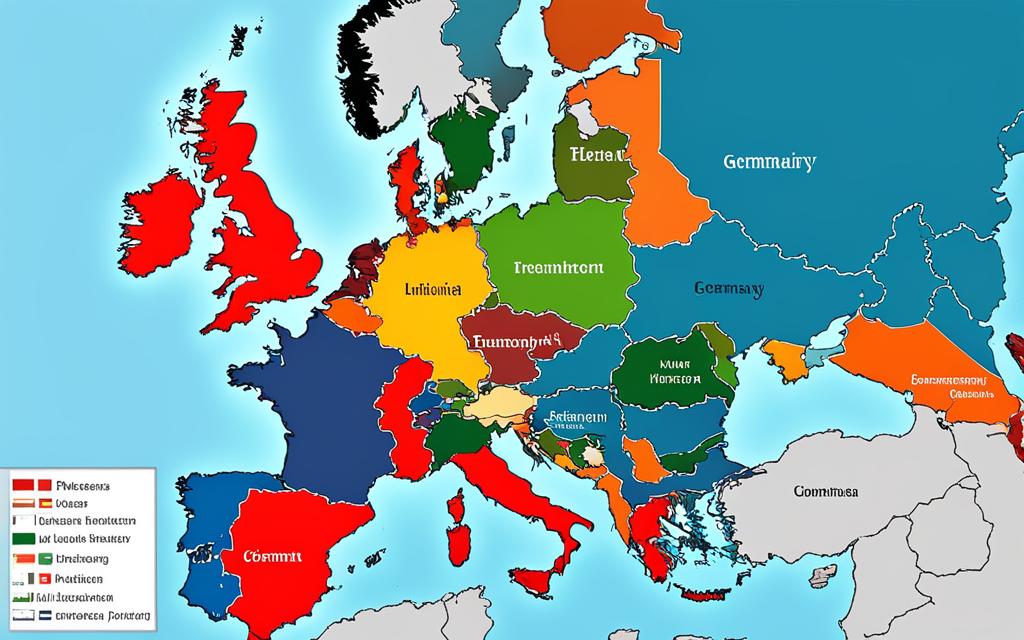Hello and welcome to our article on Germany’s strategic geographical position and its impact on European and global affairs. Germany, with its unique location, plays a crucial role in shaping policies, driving economic interactions, and influencing international diplomacy.
When discussing Germany’s strategic importance, it’s impossible to ignore its central location in Europe. Situated in the heart of the continent, Germany serves as a crossroads of cultures and ideas. This position as a transportation hub enables efficient trade and connectivity, making Germany an essential player in European affairs.
Furthermore, Germany acts as a vital land bridge between Eastern and Western Europe. This natural connection between diverse markets allows for the smooth flow of goods and services, playing a significant role in shaping Germany’s trade policies and international relations.
Germany’s access to major waterways, such as the Rhine River, is another crucial aspect of its strategic geographical position. These waterways, coupled with extensive port infrastructure, enable strong maritime connections, facilitating trade within Europe and beyond.
As the largest economy in Europe, Germany’s strategic geographical position enhances its role in both the European Union and global affairs. It holds significant influence within the EU, driving cooperation among member states and actively participating in decision-making processes. Furthermore, Germany’s central location and robust economy position it as a global leader, allowing for active international cooperation and playing a significant role in shaping global policies.
Join us as we explore these fascinating topics and gain a deeper understanding of Germany’s strategic geographical position and its far-reaching impact on European and global affairs.
Germany’s Central Location in Europe
Germany’s strategic importance is greatly influenced by its central location within Europe. Situated in the heart of the continent, Germany serves as a crossroads of cultures and ideas, making it a pivotal player in European affairs.
Sharing borders with nine different countries, Germany acts as a connection point between various nations, fostering exchange and collaboration. Its central position also grants Germany the advantage of being a key transportation hub, facilitating efficient trade and connectivity.
With its extensive network of roads, railways, and airports, Germany’s transportation infrastructure enables seamless movement of goods, people, and ideas across Europe. This not only boosts the country’s economic interactions but also positions Germany as a hub for international trade and travel.
Whether it’s the bustling ports of Hamburg and Bremen or the efficient railway systems connecting major European cities, Germany’s transportation infrastructure plays a significant role in establishing its status as a vital player in European economic integration.
As depicted in the image above, Germany’s central location is at the heart of Europe, reinforcing its position as a strategic transportation hub and a gateway to the continent.
Germany as a Land Bridge
Germany’s strategic geographical position offers a unique advantage as a land bridge between Eastern and Western Europe. This pivotal role allows for the seamless flow of goods and services, connecting diverse markets and facilitating trade routes.
Located at the crossroads of Eastern and Western Europe, Germany serves as a natural connection point between these regions. Its central location allows for efficient transportation and trade, making it an essential link in the European trade network.
Throughout history, Germany’s position as a land bridge has significantly influenced its trade policies and international relations. By bridging Eastern and Western Europe, Germany has fostered economic cooperation and stimulated the exchange of ideas, culture, and resources.
This advantageous geographical position has enabled Germany to become a crucial trade hub, facilitating the movement of goods and services across borders. By leveraging its strategic location, Germany has established itself as a key player in European trade routes, contributing to its economic strength and global influence.
Germany’s Access to Waterways
Germany’s strategic geographical position offers a significant advantage with its access to a network of waterways. One of the most notable waterways is the Rhine River, which plays a crucial role in the country’s transportation infrastructure and international trade.
The Rhine River is not only a natural boundary for Germany but also serves as a key water route connecting various European countries. Its navigable waters provide a vital link between inland regions and the global market, making it a major artery for transporting goods and fueling economic growth.
Germany’s extensive port infrastructure further enhances its maritime connections. The country’s ports, such as Hamburg and Bremen, act as gateways for international trade, facilitating the flow of goods from land to sea and vice versa. These ports are essential hubs for the import and export of commodities, attracting businesses and boosting the local economy.
The strategic utilization of waterways and ports enables Germany to establish strong trade connections not only with neighboring countries but also with partners around the world. This access provides Germany with a competitive edge in international trade, contributing to its economic strength and global influence.
Germany’s Role in European and Global Affairs
Germany’s strategic geographical position plays a crucial role in its influential position within the European Union and on the global stage. As the largest economy in Europe, Germany holds significant sway in shaping the policies and driving the international cooperation among member states. Its central location and robust economy position Germany as a global leader, enabling it to engage in international diplomacy and have a substantial impact on global decision-making processes.
Within the European Union, Germany’s influential role stems from its economic strength and its commitment to the principles of cooperation and integration. As a key member of the EU, Germany actively participates in the formation of policies that affect the entire union. Its strategic geographical position at the heart of Europe also gives it a unique perspective and understanding of the diverse needs and interests of its neighboring countries, thereby facilitating discussions and consensus-building within the EU.
Moreover, Germany’s contributions to international cooperation extend beyond the European Union. Through its proactive engagement in global affairs, Germany has emerged as a leading advocate for multilateralism, working towards the pursuit of shared objectives and solutions to pressing global challenges. Its commitment to global leadership is evident in its active participation in international organizations such as the United Nations, where it actively contributes to discussions on critical issues like climate change, peacekeeping, and humanitarian assistance.
Germany’s strategic geographical position, coupled with its economic prowess, places it at the forefront of international efforts to foster stability, prosperity, and collaboration. As a trusted partner in international cooperation, Germany continues to play a crucial role in shaping the future of both the European Union and the global community.











